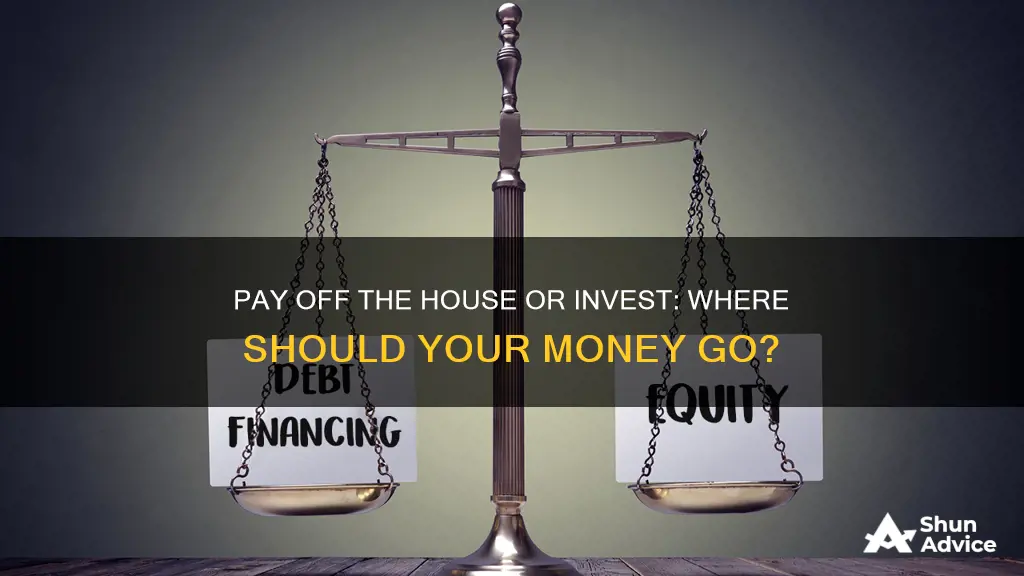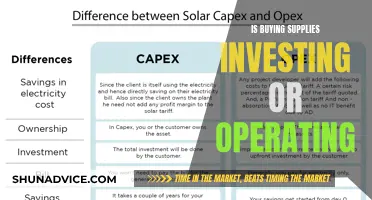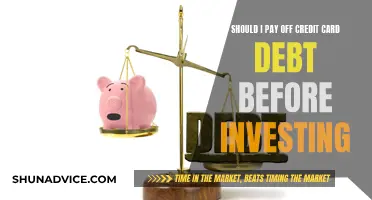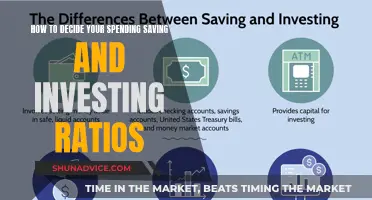
Paying off your mortgage or investing your money elsewhere is a common dilemma for many homeowners. The answer depends on your financial situation, risk tolerance, and personal preference.
Paying off your mortgage early can save you thousands of dollars in interest and provide peace of mind from being debt-free. On the other hand, investing your money can potentially earn you a higher rate of return, increase your future wealth, and provide better liquidity.
It's important to consider factors such as your mortgage rate, expected investment returns, and your financial goals when making this decision. Consulting a financial advisor can also help you assess your options and make a plan that best suits your needs.
| Characteristics | Values |
|---|---|
| Interest savings | Paying off your mortgage early can save you thousands in interest payments |
| Peace of mind | Being debt-free can ease your burden |
| Build equity | Paying down your mortgage faster means building equity in your home |
| Opportunity cost | Money spent on paying down your mortgage faster is money you can't use for other financial goals |
| Wealth is tied up | Property is an illiquid asset, meaning you can't quickly or easily convert it to cash |
| Loss of tax breaks | Paying down your mortgage instead of maxing out your tax-advantaged retirement accounts means giving up those tax savings |
| Higher returns | The stock market has historically returned an average of about 10% |
| Liquid investment | Stocks, bonds and other market investments mean you can easily sell and access your money if you need to |
| Employer match | Investing in a retirement account may come with an employer match |
| Higher risk | There is more volatility in the stock market than in the housing market |
| Increased debt | Choosing to invest your money may not be the best option if you don't like the idea of having debt |
What You'll Learn
- Paying off your mortgage early can save you thousands in interest
- Investing can offer a higher rate of return than paying off your mortgage
- Paying off your mortgage can give you peace of mind
- Investing is typically more liquid than paying off your mortgage
- Paying off your mortgage may increase your credit score

Paying off your mortgage early can save you thousands in interest
Paying off your mortgage early can save you a lot of money in interest over the long run. Even a small extra monthly payment can allow you to own your home sooner. However, it's important to weigh the benefits against the drawbacks, such as cutting into your savings or missing out on potential higher returns from other investments. Here are some key points to consider:
Pros of paying off your mortgage early
- Saving on interest: Paying off your mortgage early can potentially save you thousands of dollars in interest. The higher the interest rate on your mortgage, the more you can save by paying it off early.
- Debt-free: Owning your home outright and not having to make any more monthly payments can be liberating. This can also give you peace of mind, especially if you're retired or close to retirement.
- Leveraging equity: Paying off a large chunk of your mortgage early can increase your home equity, which you can use to open a home equity line of credit (HELOC) or do a cash-out refinance for renovations.
- Freeing up funds: If you're no longer making mortgage payments, you can invest this money elsewhere or spend it on personal hobbies.
Cons of paying off your mortgage early
- Cutting into savings: Using all your savings to pay off your mortgage early can be risky, as it may leave you without easily accessible funds in an emergency.
- Limited investments: If you're putting everything into your mortgage, you may be neglecting other important investments, such as your retirement fund. You could also potentially earn a higher return by investing in the stock market or other somewhat riskier places.
- Loss of tax deductions: Paying off your mortgage early means you'll no longer be eligible for tax deductions on mortgage interest payments, which can increase your refund and lower your taxable income.
- Prepayment penalties: Depending on your lender and the terms of your loan, you may incur a penalty for paying off your mortgage too quickly, usually within the first few years of the loan.
Factors to consider
When deciding whether to pay off your mortgage early, consider the following factors:
- Interest rates: Compare the interest rate on your mortgage to the potential returns on other investments. If you can invest your money at a higher interest rate than your mortgage, it may be more beneficial to invest rather than pay off your mortgage early.
- Financial situation: Assess your financial situation and goals. If you have other high-interest debt, such as credit card debt or student loans, it may be more advantageous to focus on paying off those first. Ensure you have an emergency fund and sufficient liquid assets before paying off your mortgage early.
- Risk tolerance: Paying off your mortgage early provides a predictable rate of return and reduces the risk of investing in the stock market or other volatile investments. However, investing offers the potential for higher returns, although it comes with higher risk.
- Peace of mind: For some people, the psychological benefits of being debt-free and owning their home outright outweigh the potential financial gains of investing elsewhere.
In conclusion, paying off your mortgage early can save you thousands of dollars in interest, but it's important to carefully consider your financial situation, investment opportunities, and personal preferences before making a decision.
Best ETFs to Invest in Now
You may want to see also

Investing can offer a higher rate of return than paying off your mortgage
For example, let's say you have a 30-year mortgage of $200,000 with a fixed rate of 4.5%. Your monthly payments would be $1,013 (not including taxes and insurance), and you'd spend a total of $164,813 in interest over the life of the loan. Now, let's assume that you're able to put an extra $300 per month towards your mortgage. By doing so, you'd pay off your mortgage 11 years early and save $67,816 in interest.
However, if you were to invest that extra $300 per month in an index fund that tracks the S&P 500, you could potentially earn a much higher return. Historically, the S&P 500 has returned an average of 10% to 11% annually since its inception in 1926 through 2018. Even if we assume a more conservative average annual return of 8%, you would still end up with $160,780 at the end of 19 years (the time it would take to pay off your mortgage early). That's more than double your potential interest savings!
Another benefit of investing instead of paying off your mortgage early is liquidity. Stocks, bonds, and similar investments are more liquid than a home, which means you can easily sell them and access your money if needed. With a house, you'd have to go through the process of finding a buyer and waiting for the sale to close, which could take time.
Additionally, if you're investing in a retirement account, your employer may match your contributions, giving you even more money to grow your wealth.
However, it's important to keep in mind that investing does come with higher risk. The stock market can be volatile, and you may experience significant gains or losses. Paying off your mortgage early provides a guaranteed return on your investment, as you save on interest payments. It also gives you the peace of mind of being debt-free and owning your home outright.
Invest Now: Where to Focus
You may want to see also

Paying off your mortgage can give you peace of mind
You'll be debt-free
Owning your own home and not having to make any more monthly payments can be liberating. Depending on the size of your monthly payments, that's $1,000 or more a month you can now use elsewhere.
You'll save on interest
If you pay off your mortgage early, you can potentially save thousands of dollars in interest you might have paid if you hadn't reduced the principal amount early on.
You can build home equity
Paying off your mortgage will increase the equity you have in your home. You can leverage this equity to take out a home equity loan or home equity line of credit (HELOC) to accomplish other financial goals.
You'll free up funds going forward
If you're no longer making mortgage payments, this money can now go to other causes, like investing in your future or personal hobbies.
You'll have more financial security
If you experience a financial emergency, having a home that's already paid off means you don't have to worry about missing mortgage payments and potentially losing the home to foreclosure.
However, there are also some drawbacks to paying off your mortgage early. You may cut into your savings, lose out on tax deductions, or face prepayment penalties. It's important to carefully consider your financial situation and goals before making a decision.
Commodity Investing: Risks and Losses
You may want to see also

Investing is typically more liquid than paying off your mortgage
When deciding whether to pay off your mortgage or invest, it's important to consider the pros and cons of each option. One key factor to keep in mind is liquidity, which refers to how easily you can access your money. Here are some paragraphs discussing why investing is typically more liquid than paying off your mortgage:
Investing offers greater liquidity compared to paying off your mortgage early. Liquidity refers to the ease of converting an asset into cash without losing value. Stocks, bonds, mutual funds, and similar investments are highly liquid, meaning they can be quickly converted into cash without significant loss. On the other hand, paying off your mortgage ties up your money in an illiquid asset – your home. If you need cash due to a financial emergency, selling stocks is much faster and simpler than selling your home or attempting a cash-out refinance.
The liquidity of investments provides flexibility and accessibility. If you invest in the stock market, you can easily sell your stocks and access the cash for other purposes. This liquidity is especially valuable if you encounter an unexpected expense or financial hardship. In contrast, accessing the equity in your home through a loan or refinance process is more complex and time-consuming.
The higher liquidity of investments also allows for more dynamic financial decisions. For example, if a lucrative investment opportunity arises, you can quickly liquidate your stocks to seize the opportunity. With a paid-off mortgage, your money is locked in your home, and you would need to go through a more lengthy and cumbersome process to access those funds.
Additionally, investments often provide the potential for compound interest, where you earn interest on your initial investment as well as on the accumulated interest from previous periods. This compounding effect can significantly increase your returns over time. However, with a paid-off mortgage, you don't benefit from compound interest, as the money is tied up in your home equity, which generally appreciates at a slower rate than potential investment returns.
While paying off your mortgage early can provide peace of mind and reduce your debt, it's important to consider the liquidity of your assets. Investing offers greater liquidity, providing you with easier access to your money when needed and enabling more dynamic financial decisions. However, it's essential to weigh this factor against other considerations, such as interest rates, risk tolerance, and your overall financial goals, to make an informed decision that aligns with your specific circumstances.
Investments After Loss: A New Chapter
You may want to see also

Paying off your mortgage may increase your credit score
Paying off your mortgage may not have a significant effect on your credit score. However, doing so may still increase your credit score in a few ways.
Firstly, paying off your mortgage early can help you build a positive credit history. This is because your credit score is calculated based on five factors: your payment history, credit utilisation ratio, length of your credit history, new credit accounts, and credit mix. By consistently paying down your mortgage, you demonstrate your ability to make timely payments and manage your debts effectively, which can positively impact your credit score.
Secondly, paying off your mortgage early can improve your credit mix. A diverse credit mix, including a variety of loan types such as mortgages, credit cards, and other credit accounts, is generally favourable for your credit score. However, if paying off your mortgage leaves you with only credit card accounts, it may negatively impact your credit mix as mortgages are considered a healthy form of debt compared to credit cards.
Additionally, paying off your mortgage early can provide you with more financial flexibility to make timely payments on other credit accounts. This can positively impact your payment history, which carries significant weight in calculating your credit score.
While paying off your mortgage may not significantly impact your credit score, it can offer other financial benefits. These include eliminating a substantial monthly payment, saving on interest charges, and achieving the peace of mind that comes with owning your home outright.
Renewables: Why the Reluctance?
You may want to see also
Frequently asked questions
Paying off your house early can save you thousands of dollars in interest in the long run. It can also be liberating to own your home and be debt-free.
Paying off your house early can cut into your savings and may be your only investment. It may also result in the loss of tax deductions.
Investing in something like the stock market gives you the potential to earn more money than you would save by paying off your mortgage early.
Investing is riskier than paying off a mortgage. You have the potential to gain and then lose thousands of dollars when investing in the stock market.
Some factors to consider are your risk tolerance, how much other debt you carry, your prospects for increasing your income, and how your mortgage rate compares to expected portfolio returns.







